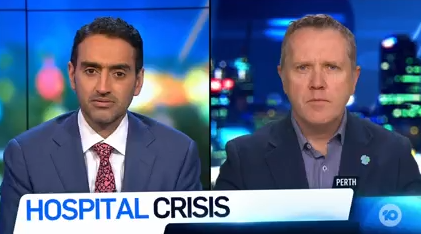

Blog

A day in the life of a hospital emergency department
Friday May 21, 2021
Here’s the interview with AMA (WA) President, Dr Andrew Miller, on The Project with Waleed Aly and Lisa Wilkinson, Thursday, 20 May 2021.
The interview refers to a meeting about Perth Children’s Hospital with Health Minister, executive and staff.
WALEED ALY: Andrew, let’s just start with that really tragic story of seven-year-old Aishwarya, who died in your state of WA. Can you just explain to us how something like that happens?
ANDREW MILLER: Well, let me take you into the emergency department that day. You work in a team. Every nurse on the team is looking after nine sick kids. You’ve had some of your staff call in sick, you’re kind of doing OK, you’re managing it, you’ve got a big wait in the waiting room. You’re only seeing 38 per cent of your patients on time. But then you get a spinal injury and bang, you call another nurse out of the waiting area. She’s got to help out with the resusc because you don’t have a dedicated nurse out there. Then you’ve got your most junior person out the front. When another kid rolls in, high fever, not looking too well, looks a lot like all the other kids that have come in, but unbeknownst to you she’s the one in many thousand that has a disease that can go downhill very quickly. That’s very sadly what happened to Aishwarya. She hit a very busy emergency department and unfortunately she was gotten to too late in order to be able to save her because the system has been underfunded, understaffed for years.
WALEED ALY: So, all right, you say underfunded, that sounds like Federal responsibility. But there’s also the running of it, which is a State responsibility, and the administrative side of it. Where do you think the lion’s share of the blame would reside in that sort of situation?
ANDREW MILLER: Well, the State has to manage it and if they don’t have enough money in Western Australia, where in the world do they have enough money? They need to go back… let them sort it out. We pay tax to all of them, that’s their problem. But our staff have been saying since at least October last year and earlier, we don’t have the right people, we are going to have a tragedy soon. The managers have ignored us and now they’re trying to throw the junior staff under the bus by sending them off to the regulator, picking little problems on the CCTV and it’s making me sick, because it should be the managers who are being looked at by the regulator, not the most junior person on the team. You don’t blame the goalkeeper when the coach didn’t put any defenders on there.
LISA WILKINSON: Andrew, another issue at the moment is the level of care at our regional hospitals. What are some of the problems that you’ve seen?
ANDREW MILLER: Well, any problem in the city you can multiply out in the regions and we have amazing doctors and nurses out there who do a huge range of things the doctors in the city wouldn’t be capable of. However, again, it’s just this lack of long-term investment, it’s the running down of the public institutions, it’s the huge distances involved, over-managerealism, not listening to the front-line staff enough and when the front-line staff speak up, complain, agitate, well, we’ll just cancel that one’s contract, fly someone in from somewhere else. So to fix those sort of issues, they’re going to need to actually start listening to people before more people unnecessarily die.
WALEED ALY: All right, Andrew, thank you so much for your thoughts tonight on a really, really tricky and challenging situation. We appreciate it.
ANDREW MILLER: Thank you, it’s always good to talk to you.
LISA WILKINSON: Thanks a lot, Andrew.

